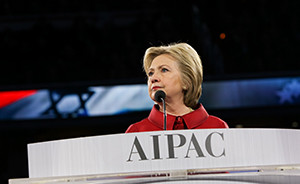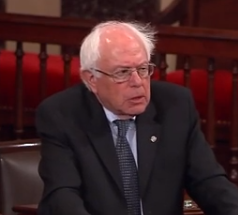The Clinton/Trump AIPAC ‘Pander-Off’

At the annual AIPAC convention, the Democratic and Republican front-runners engaged in what might be called a “pander-off” as Hillary Clinton and Donald Trump tried to outdo the other in declaring their love and devotion to Israel.
Yet, what was perhaps most troubling about the two dueling speeches was the absence of any significant sympathy for the Palestinian people or any substantive criticism of the government of Israeli Prime Minister Benjamin Netanyahu.
By contrast, Sen. Bernie Sanders, who did not attend the AIPAC convention, delivered a foreign policy speech in Salt Lake City, Utah, that struck a more balanced tone and placed part of the blame for the Mideast problems on the policies of Netanyahu’s right-wing government.
However, in Washington before thousands of cheering attendees at the American Israel Public Affairs Committee convention on Monday, Clinton, Trump and two other Republican candidates, Texas Sen. Ted Cruz and Ohio Gov. John Kasich, were in full pander mode.
Image: Former Secretary of State Hillary Clinton addressing the AIPAC conference in Washington D.C. on March 21, 2016. (Photo credit: AIPAC)
For instance, former Secretary of State Clinton depicted Israel as entirely an innocent victim in the Mideast conflicts.
“As we gather here, three evolving threats — Iran’s continued aggression, a rising tide of extremism across a wide arc of instability, and the growing effort to de-legitimize Israel on the world stage — are converging to make the U.S.-Israel alliance more indispensable than ever,”
she declared.
“The United States and Israel must be closer than ever, stronger than ever and more determined than ever to prevail against our common adversaries and to advance our shared values. … This is especially true at a time when Israel faces brutal terrorist stabbings, shootings and vehicle attacks at home. Parents worry about letting their children walk down the street. Families live in fear.”
Yet, Clinton made no reference to Palestinian parents who worry about their children walking down the street or playing on a beach and facing the possibility of sudden death from an Israeli drone or warplane. Instead, she scolded Palestinian adults. “Palestinian leaders need to stop inciting violence, stop celebrating terrorists as martyrs and stop paying rewards to their families,” she said.
Then, Clinton promised to put her future administration at the service of the Israeli government, asking: “The first choice is this: are we prepared to take the U.S./Israel alliance to the next level?”
Clinton said, “One of the first things I’ll do in office is invite the Israeli prime minister to visit the White House. And I will send a delegation from the Pentagon and the Joint Chiefs to Israel for early consultations. Let’s also expand our collaboration beyond security.”
Clinton lashed out at the global boycott, divestment and sanctions (BDS) movement which has sought to convince Israel to respect the human and political rights of Palestinians by applying economic and moral pressure on Israeli businesses. Yet, instead of a non-violent movement to achieve change in the Israeli-Palestinian dynamic, Clinton saw anti-Semitism.
“Particularly at a time when anti-Semitism is on the rise across the world, especially in Europe, we must repudiate all efforts to malign, isolate and undermine Israel and the Jewish people,” she said, adding: “we have to be united in fighting back against BDS.”
Clinton also indirectly criticized Trump for having said earlier in the campaign that the United States should be “neutral” in its handling of peace talks between Israelis and Palestinians.
“Yes, we need steady hands, not a president who says he’s neutral on Monday, pro-Israel on Tuesday, and who knows what on Wednesday, because everything’s negotiable,” Clinton declared.
Trump’s No-Pander Pander
Speaking after Clinton’s appearance, Trump asserted that “I didn’t come here tonight to pander to you about Israel. That’s what politicians do: all talk, no action. Believe me.”
Image: Republican presidential candidate Donald Trump speaking to the AIPAC conference in Washington D.C. on March 21, 2016. (Photo credit: AIPAC)
Trump then took on the challenge of out-pandering Clinton. Trump pandered to Israel’s hatred of Iran, vowing “to dismantle the disastrous deal with Iran” restraining its nuclear program. He also pandered about Iran’s role in terrorism.
“They’ve got terror cells everywhere, including in the Western Hemisphere, very close to home,” Trump said. “Iran is the biggest sponsor of terrorism around the world. And we will work to dismantle that reach, believe me, believe me.”
However, in the real world, Iran has actually assisted the governments of Iraq and Syria in battling the Islamic State and Al Qaeda, while Saudi Arabia, Qatar, Turkey and – to a lesser degree – Israel have provided help to Sunni jihadists, especially in Syria, to counter what the Sunni-led states and Israel see as excessive Shiite influence in the Middle East.
In his pandering, Trump also exposed his ignorance about Israeli-Palestinian history. He asserted, “There is no moral equivalency [between the Israelis and the Palestinians]. Israel does not name public squares after terrorists.”
But that’s not exactly true. The most revered Israeli leader, in terms of having his name attached to streets, squares and parks, is Ze’ev Jabotinsky, founder and leader of the Irgun, a terror group that fought for the founding of Israel. Jabotinsky has some 57 sites named for him.
One of his Irgun followers, Menachem Begin, has his name commemorated in at least 43 communities. Similarly, Yitzhak Shamir, a leader of Lehi (also known as the Stern Gang), a terror group that joined with the Irgun in carrying out ethnic cleansing of Palestinians including the infamous Deir Yassin massacre, has his name attached to a Jerusalem highway.
Image: Bodies of Palestinian refugees at the Sabra camp in Lebanon, 1982. (Photo credit: U.N. Relief and Works Agency for Palestine Refugees)
But more significant than the honorific naming of public sites is the fact that Begin and Shamir were elected as Israeli prime ministers. In other words, Israel doesn’t just honor its terrorists by naming public squares after them; it gave them the power to direct military actions against Palestinians and other people in the region, including Begin’s 1982 invasion of Lebanon, which led to the Sabra and Shatila massacres of Palestinians.
But Trump’s pandering even extended to mentioning his and his family’s longtime devotion to Israel, including a reference to his daughter marrying an Orthodox Jew, converting to Judaism and now pregnant: “I love the people in this room. I love Israel. I love Israel. I’ve been with Israel so long in terms of I’ve received some of my greatest honors from Israel, my father before me, incredible. My daughter, Ivanka, is about to have a beautiful Jewish baby.”
Respecting the Palestinians
By contrast, Sanders, the only Jewish candidate and someone who lived on an Israeli kibbutz as a young man, did not attend the AIPAC conference, citing a scheduling conflict for his campaign which was hoping to close Clinton’s formidable delegate lead with strong showings in Utah, Idaho and Arizona.
Instead, Sanders gave a foreign policy speech that he claimed he would have given if he had addressed the AIPAC convention. While critical of Iranian and Palestinian leaders, Sanders offered a much more evenhanded assessment of the reasons for the troubled Middle East.
Sanders stressed that his overall approach to the region would be to emphasize diplomacy among the Mideast countries instead of concentrating on threats and the use of force. He also called for a recognition of the legitimate rights of the Palestinians.
“To be successful, we have also got to be a friend not only to Israel, but to the Palestinian people, where in Gaza unemployment today is 44 percent and we have there a poverty rate which is almost as high,” the Vermont senator said. “You can’t have good policy that results in peace if you ignore one side.”
While insisting on security for Israel, Sanders said,
“peace also means security for every Palestinian. It means achieving self-determination, civil rights, and economic well-being for the Palestinian people. Peace will mean ending what amounts to the occupation of Palestinian territory, establishing mutually agreed upon borders, and pulling back settlements in the West Bank. … It is absurd for elements within the Netanyahu government to suggest that building more settlements in the West Bank is the appropriate response to the most recent violence.”
Image: Sen. Bernie Sanders of Vermont, who is seeking the Democratic presidential nomination.
Sanders also touched on other sensitive issues that Clinton and Trump avoided. Sanders said,
“Peace will also mean ending the economic blockade of Gaza. And it will mean a sustainable and equitable distribution of precious water resources so that Israel and Palestine can both thrive as neighbors.
“Right now, Israel controls 80 percent of the water reserves in the West Bank. Inadequate water supply has contributed to the degradation and desertification of Palestinian land. A lasting peace will have to recognize Palestinians are entitled to control their own lives and there is nothing human life needs more than water.”
Sanders continued, “Peace will require strict adherence by both sides to the tenets of international humanitarian law. This includes Israel ending disproportionate responses to being attacked – even though any attack on Israel is unacceptable.”
While condemning rocket fire from Gaza into Israel in 2014, Sanders added,
“let me also be very clear: I – along with many supporters of Israel – spoke out strongly against the Israeli counter attacks that killed nearly 1,500 civilians and wounded thousands more. I condemned the bombing of hospitals, schools and refugee camps. Today, Gaza is still largely in ruins. The international community must come together to help Gaza recover.”
Regarding his earlier comments about wealthy Sunni-led oil states taking on a greater regional role in fighting jihadist extremism, such as Islamic State terrorists, Sanders clarified,
“Now, I am not suggesting that Saudi Arabia or any other states in the region invade other countries, nor unilaterally intervene in conflicts driven in part by sectarian tensions.
“What I am saying is that the major powers in the region – especially the Gulf States – have to take greater responsibility for the future of the Middle East and the defeat of ISIS. … What I am also saying is that other countries in the region – like Saudi Arabia, which has the fourth largest defense budget in the world – has to dedicate itself more fully to the destruction of ISIS, instead of other military adventures like the one it is pursuing right now in Yemen.”
Sanders also distanced himself from Hillary Clinton who has urged a U.S. military bombing campaign against the Syrian government, or as she tries to sell the idea as a “safe zone” or a “no-fly zone” though U.S. military officials say either idea would require a major aerial assault on Syria’s air force and air defenses.
In contrast, Sanders said,
“After five years of brutal conflict, the only solution in Syria will be, in my view, a negotiated political settlement. Those who advocate for stronger military involvement by the U.S. to oust Assad from power have not paid close enough attention to history. That would simply prolong the war and increase the chaos in Syria, not end it.”
Sanders even envisioned working with Russia and Iran to stabilize Syria, defeat ISIS and arrange a transitional government, adding:
“I applaud Secretary Kerry and the Obama administration for negotiating a partial ceasefire between the Assad regime and most opposition forces. The ceasefire shows the value of American-led diplomacy, rather than escalating violence. It may not seem like a lot, but it is. Diplomacy in this instance has had some real success.”
Overall, Sanders advocated less reliance on “regime change” strategies that require military force, saying:
“In my view, the military option for a powerful nation like ours – the most powerful nation in the world – should always be on the table. That’s why we have the most powerful military in the world. But it should always be the last resort not the first resort. …
“You know it is very easy for politicians to go before the people and talk about how tough we are, and we want to wipe out everybody else. But I think if we have learned anything from history is that we pursue every diplomatic option before we resort to military intervention. And interestingly enough, more often than not, diplomacy can achieve goals that military intervention cannot achieve.”
Sanders may have waited too long to give a detailed foreign policy speech, letting Clinton mostly off the hook for her neoconservative tendencies and her support for “regime change” wars in Iraq, Libya and Syria. Most political analysts say he is too far behind in the delegate count to catch up even if his campaign catches on fire in the later primary states, such as California and New York.
Only now has Sanders explained in detail his more nuanced approach toward the Israel-Palestine conflict and his more dovish attitude toward using American military force, in contrast to Clinton’s one-sided attitude toward Israel and her hawkish talk about exerting U.S. power.
Indeed, Clinton’s neocon-style speech to AIPAC could be the first sign of her long-awaited “pivot to the center,” now that she has amassed such a strong lead that she feels she no longer has to worry about the Democratic Party’s liberal base.
Investigative reporter Robert Parry broke many of the Iran-Contra stories for The Associated Press and Newsweek in the 1980s. You can buy his latest book, America’s Stolen Narrative, either in print here or as an e-book (from Amazon andbarnesandnoble.com).





